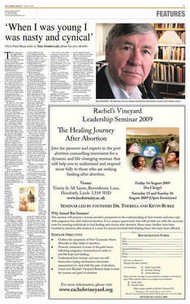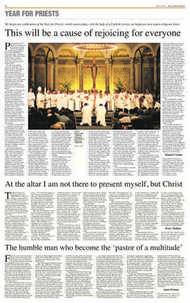Page 1, 19th June 2009
Page 1

Report an error
Noticed an error on this page?If you've noticed an error in this article please click here to report it.
Tags
Share
Related articles
Put God At Heart Of Economy, Says Pope
Uphold Rights Of Migrants, Says Benedict Xvi
Canadian Leader Holds Frank Talks With Holy Father
Pope Pays Tribute To Vision Of Leo Xiii
Archbishop Blames Financial Crisis On Lack Of Virtue
Pope Benedict Puts God At The Heart Of Globalisation
Benedict calls for new world economic order
Pope’s third encyclical to promote solidarity with poor
BY ANNA ARCO
POPE BENEDICT XVI has called for a new world economic order that promotes human dignity and solidarity.
Addressing the financial crisis that has swept the world this year, Pope Benedict said that “economic and financial paradigms that have been dominant in recent years must be re-thought”.
A new model of development should take its place that is “more attentive to the demands of solidarity and more respectful of human dignity”, he told members of the Centesimus Annus Pro Pontifice Foundation, an organisation which promotes Catholic social teaching.
The Pope’s comments came as the Confederation of British Industry (CBI) predicted that economic recovery in Britain would be “slow and gradual” and the global economy continued to suffer turbulence.
The Pope offered a sneak preview of his long-expected, muchdelayed social encyclical Caritas in Ueritate (Love in Truth).
He said: “As you know, my encyclical on the vast theme of economics and labour will soon be published. It will highlight what, for us Christians, are the objectives to be pursued and the values to be promoted and tirelessly defended, with the purpose of realising a truly free and human coexistence in solidarity.” Unlike Pope Benedict’s two previous encyclicals – Deus Caritas Est and Spe Salvi – Caritas in Ueritate is the work of several Vatican committees of consultants and experts. Originally, it was reported to be a five-chapter encyclical with the first half recalling earlier social encyclicals while the second half dealt with a broad analysis of the effects of globalisation. During the audience with members of the foundation, the Pope highlighted the need for an economic system that was oriented towards the common good and at the service of human freedom.
Reflecting on John Paul II’s 1991 social encyclical Centesimus Annus, he said: “[Beginning] from the reflection according to which the market economy, understood as ‘an economic system which recognises the fundamental and positive role of business, the market, private property and the resulting responsibility for the means of production, as well as free human creativity in the economic sector’, can only be recognised as a way of economic and civil progress if it is oriented to the common good.
“Such a vision, however, must also be accompanied by another reflection according to which freedom in the economic sector must situate itself ‘within a strong juridical framework which places it at the service of human freedom in its totality’, a responsible freedom ‘the core of which is ethical and religious’.
“This encyclical opportunely affirms that: ‘The person fully realises himself in the free gift of self, so too ownership morally justifies itself in the creation, at the proper time and in the proper way, of opportunities for work and human growth for all’.” Pope Benedict has consistently called for a more healthy “human ecology”, especially in the face of the global recession.
The effect of globalisation and the global financial crisis on the developing world has been a subject of grave concern for the Pope and a theme that has surfaced frequently in his recent speeches.
In January he said in his peace message: “For this reason, while attentively following the current phenomena of globalisation and their impact on human poverty, the Church points out the new aspects of the social question, not only in their breadth but also in their depth, insofar as they concern man’s identity and his relationship with God.
“These principles of social teaching tend to clarify the links between poverty and globalisation and they help to guide action towards the building of peace.” Earlier this year he again delayed the publication of the encyclical, already almost two years overdue, in order to better understand the financial crisis.
During a question-and-answer session with Roman priests in February, during which he announced the delay, the Holy Father said that if the encyclical did not “deal competently with the economic reality, it cannot be credible”.
He said: “It is the Church’s duty to denounce the fundamental errors that have now been revealed in the collapse of the major American banks.
“Human greed is a form of idolatry that is against the true God, and is a falsification of the image of God with another god, Mammon.
“We must denounce this courageously, but also concretely, because grand moralisations are not helpful if they are not supported by a familiarity with reality, which helps us to understand what can be done concretely.
“The Church has never simply denounced evils, it also shows the paths that lead to justice, to charity, to the conversion of hearts. In the economy as well, justice is established only if there are just persons. And these persons are assembled through the conversion of hearts.” Professor Philip Booth, editorial and programme director of the Institute for Economic Affairs, said: “We will not know precisely what the Pope had in mind until his social encyclical comes out later this year. But it would be dangerous to follow a path of greater socialisation and greater regulation of the economy and financial sector. This is a model that has been tried and which is failing.
“But what is essential is ethical renewal in all aspects of life – including in the financial sector. Trying to deal with problems such as the lack of ethics in economic life with more regulation is like trying to deal with promiscuity through sex education lessons – it is the wrong instrument.
“What is also clear is that, in the poorest countries, the basic functions of government, as described in Centesimus Annus, are not undertaken properly by government: this concern should be expressed.
“Finally, in the spirit of Deus Caritas Est, we need a renewal of solidarity – expressed through voluntary action and civil society – in all areas of life.” Kishore Jayabalan, director of the Istituto Acton in Rome, said: “Of course, the Pope is not proposing any particular structure for the world economy.
“When he calls for a new model of development, he is not speaking as an economist or central banker but as a pastor and moral leader.
“The Pope’s challenge to all of us is that we make the best possible use of our freedom and our gifts, which will require a bit more intellectual and spiritual fortitude than we’ve seen from most of our political and business leaders recently.” The encyclical is due to be released on June 29.
blog comments powered by Disqus





















